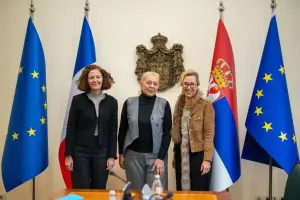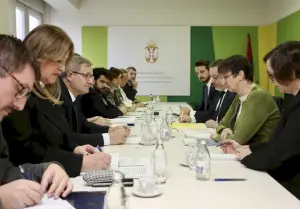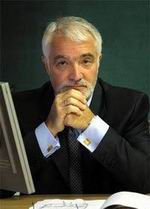- Serbia
Get to know Serbia
- Citizens
Culture and science
Health services
Pension and disability insurance
- Business
Employment
Economy
- Media
- Government
- Contact
Keep in touch
Contact form
Back
Keepin touch
Whether you have a question, comment, suggestion or any problem in the purview of the government, send us your message and we will try to respond as soon as possible. If your problem is not in our purview, we will forward your message to the relevant institution.
Q:
A:
Higher quota for sugar export result of negotiations with EU
Belgrade,
10 February 2005
Serbian Deputy Prime Minister Miroljub Labus confirmed today that the European Commission's Directorate-General for Agriculture proposed that this year's quota for the export of sugar from Serbia-Montenegro is to be increased to 180,000 tonnes, which is the highest amount approved for a western Balkan country under the preferential status.
In a statement to the Tanjug news agency, Labus said that this quota is a result of negotiations with Brussels over which time the position of our country has been improved. He said that the European Commission's decision to again allow Serbia to export sugar to the EU countries shows that the EU regained trust in the Serbian state bodies.
During the negotiations, the quota was increased by 30,000 tonnes from the initial 150,000 tonnes, which is the highest quota in all countries of the western Balkans.
Labus voiced hope that with a quota of 180,000 tonnes it will be possible to export Serbia's entire production surplus to the EU. He also hopes that the Council of the European Union will enact that decision very soon and that the Serbian Ministry of Agriculture, Forestry and Water Management uses this quota to optimal advantage.
The Deputy Prime Minister said that 205,081 tonnes of sugar were exported from August 10, 2004 to the end of January this year. Since the price is €640 per tonne, the revenues exceed €130 million, which is a substantial sum both for sugar beet and sugar producers.
Labus stressed that the present system of control of sugar export prevents a repeat of the previous situation and addresses doubts concerning the domestic origin of sugar.
The customs system has been improved, agricultural inspectors, customs and other services cooperate closely so that it is impossible to repeat the previous situation and that is how we have managed to increase the quota, the Deputy Prime Minister said.
In order for the proposal of the EC Directorate-General for Agriculture for the increase of quota to become effective, the negotiations conducted by the European Commission with all western Balkan countries have to be completed and then the EU Council must examine all proposals submitted. If that process is completed by summer, the decision on the increase of quota could become effective on July 1.
During the negotiations, the quota was increased by 30,000 tonnes from the initial 150,000 tonnes, which is the highest quota in all countries of the western Balkans.
Labus voiced hope that with a quota of 180,000 tonnes it will be possible to export Serbia's entire production surplus to the EU. He also hopes that the Council of the European Union will enact that decision very soon and that the Serbian Ministry of Agriculture, Forestry and Water Management uses this quota to optimal advantage.
The Deputy Prime Minister said that 205,081 tonnes of sugar were exported from August 10, 2004 to the end of January this year. Since the price is €640 per tonne, the revenues exceed €130 million, which is a substantial sum both for sugar beet and sugar producers.
Labus stressed that the present system of control of sugar export prevents a repeat of the previous situation and addresses doubts concerning the domestic origin of sugar.
The customs system has been improved, agricultural inspectors, customs and other services cooperate closely so that it is impossible to repeat the previous situation and that is how we have managed to increase the quota, the Deputy Prime Minister said.
In order for the proposal of the EC Directorate-General for Agriculture for the increase of quota to become effective, the negotiations conducted by the European Commission with all western Balkan countries have to be completed and then the EU Council must examine all proposals submitted. If that process is completed by summer, the decision on the increase of quota could become effective on July 1.
-
 Belgrade, 28 November 2025
Belgrade, 28 November 2025Serbia, Italy dedicated to further strengthening partnership
-
 Belgrade, 28 November 2025
Belgrade, 28 November 2025Partnership with EU important for improvement of human, minority rights
-
 Belgrade, 28 November 2025
Belgrade, 28 November 2025Italy one of Serbia’s most important bilateral partners
-
 Belgrade, 28 November 2025
Belgrade, 28 November 2025Four bilateral documents exchanged between Serbia, DR Congo
-
 Belgrade/The Hague, 27 November 2025
Belgrade/The Hague, 27 November 2025Serbia committed to European integration process
-
 Belgrade, 27 November 2025
Belgrade, 27 November 2025Strengthening relations between Serbia, France through major infrastructure projects
-
 Belgrade, 27 November 2025
Belgrade, 27 November 2025Serbia, Germany dedicated to intensifying cooperation in field of agriculture
-
 Belgrade, 27 November 2025
Belgrade, 27 November 2025Cooperation with Montenegro in modernising public administration
-
 Belgrade, 26 November 2025
Belgrade, 26 November 2025CEI region remains committed to connectivity, integration, innovation
-
 Belgrade, 26 November 2025
Belgrade, 26 November 2025Joint work of Serbia, Ukraine in European integration process


